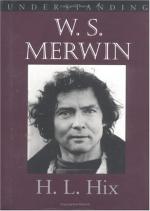|
This section contains 501 words (approx. 2 pages at 300 words per page) |

|
As W. S. Merwin's work illustrates, the poet today wins his audience by involving it in his seemingly personal activity—or, as Merwin writes in "An Encampment at Morning," "I come that way in a breath cloud / learning my steps / … we are words on a journey / not the inscriptions of settled people." (p. 88)
The presence of the Merwin persona haunts all the poems of The Compass Flower. "I love voices not heard," "I consider life after life as treasures," "I have been younger in October," "I have watched your smile in your sleep"—whether or not the poem opens with the activity of the poet-persona, that activity, that recognition, is the heart of the poem. Meditative in both language and structure, Merwin's poems circle, angle, fuse: they do not aim for the normal chronological progression of story, of language caught in time. Merwin's language is caught in ontological...
|
This section contains 501 words (approx. 2 pages at 300 words per page) |

|


